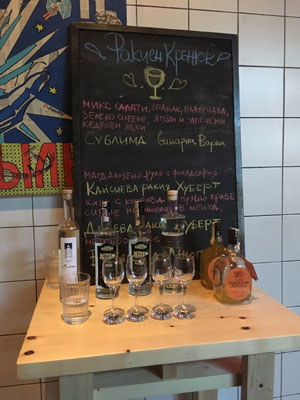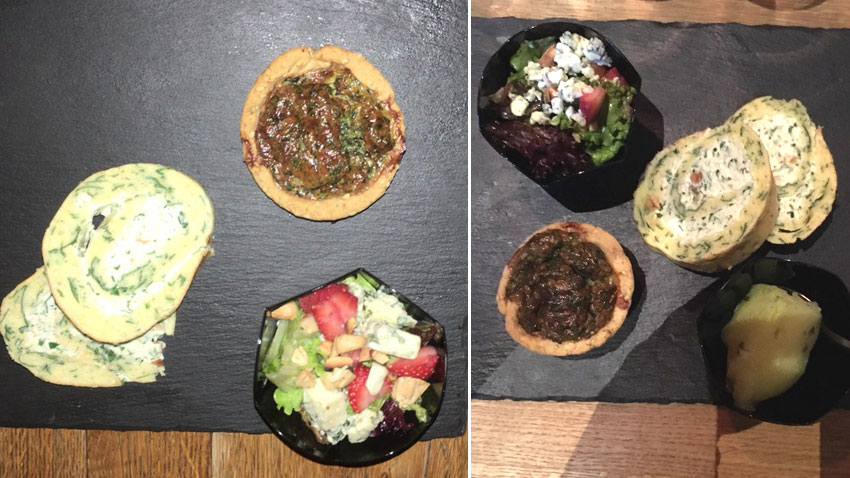Bulgarian rakia /brandy/ is a traditional strong alcoholic beverage that is prepared via the distillation of fermented fruit, typical for other Balkan states as well. However, do Bulgarians themselves know how to combine the different kinds of brandy with the proper meze /appetizer/? Gergana and Svetlin Mirchev provide the answers to these questions in their rakia workshops.
 “The idea was born 3 years ago,” Svetlin Mirchev says. “We have developed a different appetizer for each brandy and we try each variation to be interesting. Our events are educational and fun, unlike the traditional gustation ones. Our goal is to teach people how to consume alcohol and fruit alcohol in particular. We call on people to combine the proper food with the proper drink. Each workshop is subjected after a certain combination of brandies – for instance summer or winter ones, or old brandies, or plump, or grape rakias etc.”
“The idea was born 3 years ago,” Svetlin Mirchev says. “We have developed a different appetizer for each brandy and we try each variation to be interesting. Our events are educational and fun, unlike the traditional gustation ones. Our goal is to teach people how to consume alcohol and fruit alcohol in particular. We call on people to combine the proper food with the proper drink. Each workshop is subjected after a certain combination of brandies – for instance summer or winter ones, or old brandies, or plump, or grape rakias etc.”
“There are no traditional appetizers for rakia,” Svetlin says. “There are traditional ones for the different types of the beverage. I have often stated that the so famous in Bulgaria Shopska salad is not a good meze for rakia due to the high level of acidity of its tomatoes – and our brandy is usually a highly acidic beverage as well. This is not the greatest combination of all from any perspective.”
Which are the best combinations then? Apricot brandies are consumed with green salads – spinach, dock, lettuce and also with very light cheese – fresh cheese, or mozzarella and also with eggs. Plump rakia is usually old and stronger and goes better with dry meat. The grape brandies combine well with any kind of salads with some meat or ham inside. The older ones go with slightly baked cheese and meat that is not too dry. Then when you talk about quince brandy practically anything suits it, as long as its level of acidity remains lower. The pear rakia also requires light cheese or sorbet. Some pear brandies combine really well with blue cheese, others – with prosciutto.

Is there a certain season for rakia?
“We try to show that there is not,” Gergana Mircheva replies. “Everyone says that summertime is no good for rakia, which is rather considered a winter drink. At the same time many rakias are drunk in the summer exclusively – fresh grape, fresh quince, fresh apricot… Pear brandy is particularly suitable for the warm months and also apple brandy with several drops of homemade honey added to it, and when it’s really well chilled…”
The right temperature is the next essential thing – fruit alcohol beverages are consumed at a temperature of 12 – 20C. If you keep rakia in a common fridge it reaches the optimum consuming temperature the moment you pour it into a glass.
“People should know what they would like to eat and what is the right combination of food and alcohol, because it changes the overall experience. My piece of advice is to drink rakia the way you like it,” Svetlin says. “However, prior to placing in it an ice cube or pouring anything in to dilute it, you might want to taste its original version, because rakia has a message that has to be passed on to people. The expert that has produced it has achieved certain balance and that balance is worth being tasted.”
English version: Zhivko Stanchev
The 33rd Bulgarian polar expedition is heading to Antarctica to continue its scientific research in cooperation with scientists from different countries. For the first time, travelers from two Balkan countries - Greece and Montenegro, as well as from..
The program of the Orthodox Book Week offers meetings with authors, publishers and translators of Orthodox books from the last few years. The event is held until November 10 at the ''St. Procopius of Varna'' Church, with meetings taking place every..
The "Kabiyuk" horse breeding farm in the village of Konyovets is the oldest stud farm in Bulgaria, founded in 1864 by Midhat Pasha, the governor of the vilayet of Ruse, to produce horses for the Turkish army. The farm existed until the Russo-Turkish War..
For the 30th consecutive year, the Bulgarian Posts organize a contest for the most beautiful letter to Santa Claus. Letters must be sent by 18..

+359 2 9336 661
